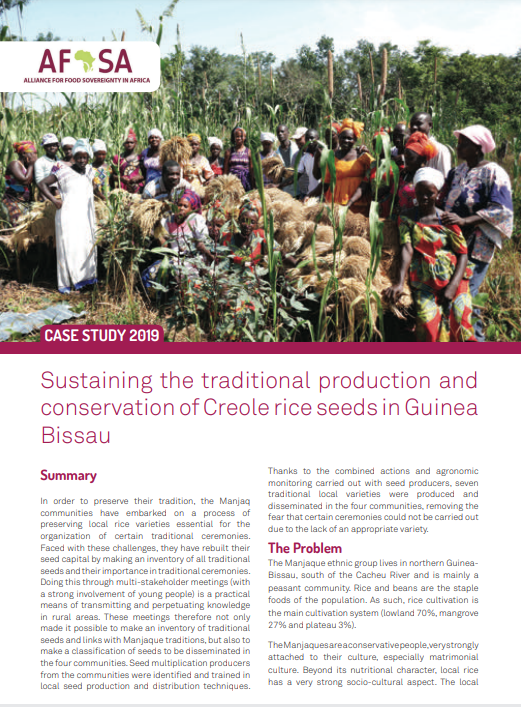Knowledge Hub
Gender in Adaptation Planning for the Agriculture Sectors
2019
Author(s): Nelson S , Hill C
The emphasis is on adaptation in agriculture, however the materials can be applied to planning for climate change adaptation in other sectors. In addition to this Guide for Trainers, there are companion PowerPoint templates that workshop organizers can tailor to their specific context.
Addressing Agriculture, Forestry and Fisheries in National Adaptation Plans – Supplementary Guidelines
2017
Author(s): Karttunen K,Wolf J , Garcia C , Meybeck A
The Guidelines aim to support developing countries in: i) reducing vulnerability of the agriculture sectors to the impacts of climate change by building adaptive capacities and resilience; ii) addressing agriculture in the formulation and implementation of NAPs; and iii) enhancing the integration of adaptation in agricultural development policies, programmes and plans.

Sustaining The Traditional Production and Conservation of Creole Rice Seeds in Guinea Bissau
2019
Author(s): Junior LP
In order to preserve their tradition, the Manjaq communities have embarked on a process of preserving local rice varieties essential for the organization of certain traditional ceremonies. Faced with these challenges, they have rebuilt their seed capital by making an inventory of all traditional seeds and their importance in traditional ceremonies.
Linking People for Quality Products: Sustainable Interprofessional Bodies for Geographical Indications
2017
Author(s): Damary P , Bernardoni P , Couillerot C , Perret A
The content and theory pages of this training manual set out the basic concepts, while the exercise sheets provide for participative activities. The trainer notes, together with the introduction, guide trainers in the preparation of tailored training in relation to the five steps of the virtuous circle.
Nature-based Solutions (NBS) for Climate Change: a Vision from Indigenous Peoples
2020
Publisher/Organisation: Indigenous peoples International Centre for policy research and education
The text discusses the adoption and definition of Nature-Based Solutions (NBS) for addressing societal and environmental challenges, its growing popularity and criticism for potential greenwashing, as well as the Green Climate Fund's development of sector guides to guide investments in impactful areas.
In the Rupununi, the SWM Programme is being implemented by the Guyana Wildlife Conservation and Management Commission in coordination with CIFOR. Guyana is one of twelve African, Caribbean and Pacific (ACP) countries participating in the initiative. The SWM Programme is co-funded by the European Union and the French Facility for Global Environment.
Training Manual for Organic Agriculture
2015
Author(s): Gomez I , Thivant L , TECA Team – Research and Extension Division (DDNR) of the Food and Agriculture Organization of the United Nation (FAO)
Organic agriculture follows the principles and logic of a living organism, in which all elements (soil, plant, farm animals, insects, the farmer and local conditions) are closely linked to each other. Organic agriculture shares many techniques used by other sustainable agricultural approaches (e.g. intercropping, crop rotation, mulching, integration of crops and livestock).
UNEP and Indigenous Peoples: A Partnership in Caring for the Environment Policy Guidance November 2012
2012
Publisher/Organisation: United Nations Environment programme
The Policy Guidance to UNEP aims to better understand and build on Indigenous Peoples' rights and knowledge, ensuring their active and continuous engagement as environmental policy partners based on recommendations from the UNPFII and the UNDRIP, with regular reviews every four years.

Seed Guardians - How families in Brazil are increasing biodiversity with help from the past.
2021
Author(s): IFAD
Extensive livestock raising, slash and burn agriculture and uncontrolled demand for wood fuel has have led to widespread environmental degradation of its unique Caatinga biodiversity.

Poultry waste is rich in nitrogen and other nutrients, and is good food for beneficial microbes in the soil. Mix it with decomposed cow dung and carbon-rich materials. To speed up decomposition, sp...



